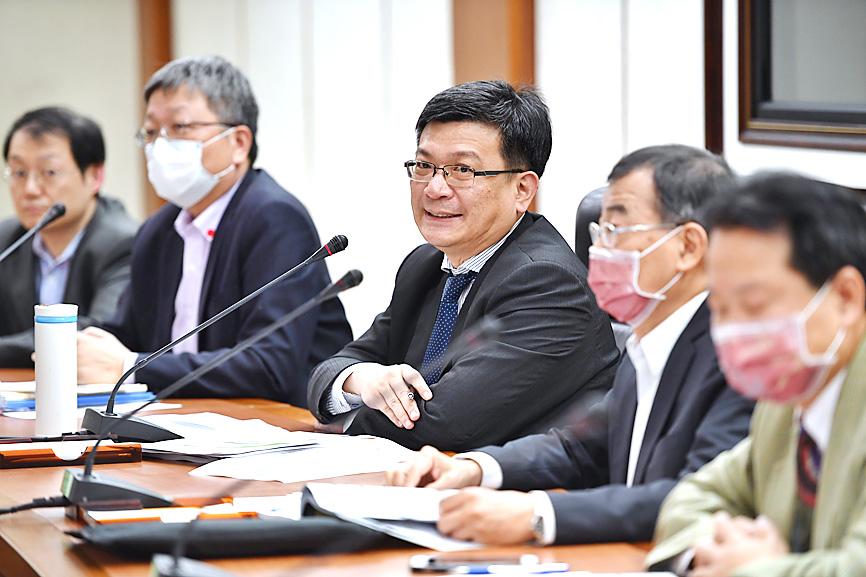Electricity rates are to remain unchanged at an average of NT$2.6253 per kilowatt-hour over the next six months, the Ministry of Economic Affairs said on Friday.
The decision came after a meeting of its electricity price review committee on Friday, which considered maintaining stability of electricity prices amid the COVID-19 pandemic.
The committee has not adjusted electricity rates since September 2018, making this the longest price freeze on record in Taiwan, ministry data showed.

Photo: CNA
While Taiwan Power Co (Taipower, 台電) suggested a slight rate increase of 0.07 percent, the committee decided to keep prices unchanged for the second and third quarters, the ministry said.
“Fuel costs are the main factor affecting electricity rates,” it said in a statement. “Recently, not only have international crude oil prices gradually rebounded, but coal prices have also risen.”
“However, it is still necessary to continue to monitor the containment of COVID-19 globally and the recovery of overall demand before determining whether the increase in fuel prices is a long-term trend,” it added.
The ministry said that the committee had pointed out that an adjustment to the nation’s energy structure would increase the cost of generating electricity, while electricity rates that adequately reflect the adjustment would help promote energy-saving policies.
The committee decided not to adjust the rates because, while the rate hike proposed by Taipower was not large, the administrative work required to enforce the increase could cost more than the 0.07 percent adjustment, Deputy Minister of Economic Affairs Tseng Wen-sheng (曾文生) told a news conference.
The committee would consider the effects of an adjustment to the nation’s power-generation structure on electricity rates at its next review meeting in September, when it would set the rates for the last quarter of this year and the first quarter of next year, Tseng said.
There is also no need to raise rates, as Taipower posted its first profit in five years in the first quarter, he said.
Taipower posted a profit of NT$8 billion (US$279.7 million) in the January-to-March period, thanks to lower power-generation costs, Tseng said, adding that the state-run company reported NT$26.1 billion in profit for the whole of last year.
Separately, the problem of a container vessel blocking the Suez Canal would not disrupt the nation’s liquefied natural gas (LNG) imports, the Bureau of Energy said on Friday.
The bureau said that Taiwan has signed long-term LNG contracts with several countries, including Australia, Papua New Guinea, Russia, Qatar and the US.
As LNG ships from those countries do not pass through the Suez Canal on their way to Taiwan, the incident would not affect the nation’s LNG imports, the bureau said.
“Last year, the nation’s LNG imports came from 13 countries, and the shipping routes from the sources differed,” the bureau said. “In the event of an emergency where imports are blocked, Taiwan can consult other long-term gas sources to procure and dispatch LNG.”

South Korea’s equity benchmark yesterday crossed a new milestone just a month after surpassing the once-unthinkable 5,000 mark as surging global memory demand powers the country’s biggest chipmakers. The KOSPI advanced as much as 2.6 percent to a record 6,123, with Samsung Electronics Co and SK Hynix Inc each gaining more than 2 percent. With the benchmark now up 45 percent this year, South Korea’s stock market capitalization has also moved past France’s, following last month’s overtaking of Germany’s. Long overlooked by foreign funds, despite being undervalued, South Korean stocks have now emerged as clear winners in the global market. The so-called “artificial intelligence

Chinese artificial intelligence (AI) start-up DeepSeek’s (深度求索) latest AI model, set to be released as soon as next week, was trained on Nvidia Corp’s most advanced AI chip, the Blackwell, a senior official of US President Donald Trump’s administration said on Monday, in what could represent a violation of US export controls. The US believes DeepSeek will remove the technical indicators that might reveal its use of American AI chips, the official said, adding that the Blackwells are likely clustered at its data center in Inner Mongolia, an autonomous region of China. The person declined to say how the US government received

‘SEISMIC SHIFT’: The researcher forecast there would be about 1.1 billion mobile shipments this year, down from 1.26 billion the prior year and erasing years of gains The global smartphone market is expected to contract 12.9 percent this year due to the unprecedented memorychip shortage, marking “a crisis like no other,” researcher International Data Corp (IDC) said. The new forecast, a dramatic revision down from earlier estimates, gives the latest accounting of the ongoing memory crunch that is affecting every corner of the electronics industry. The demand for advanced memory to power artificial intelligence (AI) tasks has drained global supply until well into next year and jeopardizes the business model of many smartphone makers. IDC forecast about 1.1 billion mobile shipments this year, down from 1.26 billion the prior

FORTUNES REVERSED: The new 15 percent levies left countries with a 10 percent tariff worse off and stripped away the advantage of those with a 15 percent rate In a swift reversal of fortunes, countries that had been hardest hit by US President Donald Trump’s tariffs have emerged as the biggest winners from the US Supreme Court’s decision to strike down his emergency levies. China, India and Brazil are among those now seeing lower tariff rates for shipments to the US after the court ruled Trump’s use of the International Emergency Economic Powers Act to impose duties was illegal. While Trump subsequently announced plans for a 15 percent global rate, Bloomberg Economics said that would mean an average effective tariff rate of about 12 percent — the lowest since